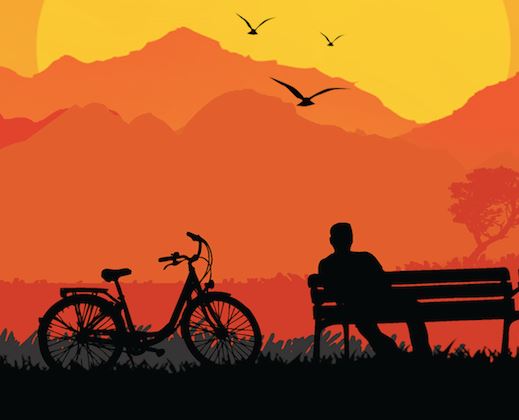Why Embracing Your Fear Of Failure Is The Better Option
Fear Of Failure
Fear of failure is deeply embedded in our minds. To a large extent it's a cultural thing.
Most motivational speeches have an anecdote that features how someone
dealt with their fear of failure, overcame tremendous odds and yet came
home a winner.
The personal development and self-help world is steeped in case studies and analysis of success.
We Celebrate Success And Ignore Failure
Numerous
studies have been undertaken on successful people to understand what it
was that they did to become so successful, how they did it and when
they did it - and we are led to believe that we too can achieve
comparable success if we replicate this.
We are told by the self-help gurus:
“You can be anything you want to be, if you put your mind to it.”
“Your thoughts have resonance and if you think enough positive thoughts for long enough, they will manifest.
But what the self help gurus tell you is just not true.
This focus on success is very odd given that:
Success is the exception rather than the rule
Every scientific discovery, every new invention, every great innovation, every new idea of substance is the product of innumerable failures.
Hard work, skill, focus and persistence are not enough without the randomness of chance and the alignment of many factors, principally being in the right place with the right offering at the right time in the right environment.
- Most people do not realise all of their dreams.
- Most of the time, most of us fail.
- For every successful business person there so many more who have failed - over 95% of new businesses fail.
- Many people do not find the life-partner of their dreams.
- Most of the time, your plans do not work out as you wanted them to.
Failure is the norm
Life
itself is driven by failure. Evolution is driven by failure;
approximately 99% of species that ever existed did not adapt and did not
survive. The surviving 1% is the exception and not the rule. The
exception adapted and survived… until they died.
In the philosophical and spiritual world impermanence is recognised as the true nature of things celebrated in the homily “this too will pass”.
Nothing
lasts, ultimately everything fails. It is a fundamental truism of most
major faith traditions that death is the portal to new life, whether in
this world or the next.
Understanding our forgotten failures
As Oliver Burkeman has noted:“… it is also worth
considering the subject of failure directly, in order to see how the
desperate efforts of the ‘cult of optimism’ to avoid it are so often
counterproductive, and how we might be better off learning to embrace
it.
- The first reason to turn towards failure is that our efforts not to think about failure leave us with a severely distorted understanding of what it takes to be successful.
- The second is that an openness to the emotional experience of failure can be a stepping-stone to a much richer kind of happiness than can be achieved by focusing only on success.”
Putting Your Fear Of Failure Into Perspective
Here are some pointers to help you understand:
First some hard truths - these are examples of some of the wonky thinking that skew your perception of success and failure:
- Winners are outliers – they do not represent the common experience and they do not tell the whole story
- Survivorship bias
– a cognitive distortion that skews your understanding when you wrongly
assume that success tells you all you need to know and thus you
overestimate the real odds of success.
- Winners are not the norm - failure is the norm and winners are the exception. People like Bill Gates are the outlier, the exception, the anomaly. Modelling yourself on Bill Gates will not make you into a major success.
- Ignoring the base rate data - that is, the odds of success (or failure) based on prior probabilities. In practise this means ignoring the percentage of a population or universe of data which has a particular characteristic. Successful people usually represent a very small subset of all those in their field.
- Ignoring the base-rate information in the light of personal data - for example 50% of marriages fail but “we are so in love and it will never happen to us….”
- Confusing co-incidence and causation - success is often attributed to a correlation or causation that just does not exist.
Now for some of the emotional factors that blindside you:
- Craving a credible and coherent success story - the successful exceptions feed your need to believe that if they can do it so can you.
- Inflated perception of your chances of success - you need to be cautious of advice from the successful and deeply realistic with your understanding of reality.
Here are some practical tips, based on my own experience:
- Learn from the failures and the successes - learning from the successful – teaches you far less than learning from the failures. The wisest strategy is to learn from both successes and failures.
- Dig deep in your search for true understanding of success and failure - history is written by the winners, the same applies to the recorded knowledge of success. Often the failures end up ignored and voiceless, so what you read and what you hear is a distortion of what really happened.
- Talk to those at the coal-face or the front line - the unsung people under-recognised people who are directly involved in whatever field you aim to succeed in can tell you so much more what's really involved. Seek them out, be humble, ask questions, listen and learn.
Fear Of Failure And It's Terrible Twin - Fear Of Uncertainty
Sitting alongside our fear of failure is another powerful factor and that is fear of uncertainty. Psychologist Dorothy Rowe in "Beyond Fear" has nailed it:
Our fear of failure sits alongside - maybe on top of - our fear of
uncertainty and it's grip on our sense of self and well being is
extraordinarily tight.
Dorothy Rowe argues that we fear uncertainty
more than death itself –
and we will go to extraordinary lengths and take extreme risks,
sometimes even fatal ones, to get rid of our fear of failure and our
deeper fear of uncertainty.
Goal induced comfort and the myth of fixed goals
What lies behind so much of our efforts and investment in goals and
forward planning is this deep seated dread of our feelings of
uncertainty.
We project this fixed and idealised view of our future because we tell ourselves that if we achieve it then everything will be OK and we will feel certain and secure.
Taken to extremes, and as Shane Parrish has documented and illustrated so well in "Goal Induced Blindness", this can cause us as a minimum to lose the flexibility to adapt to changing circustances and worst case to get ourselves wiped out - literally or metaphorically!
Decisions made to ease the emotional stress of uncertainty in the present moment
How many of our major life decisions are made with the aim of easing our stress at uncertainty rather than from a reasoned or intuitive sense of it being the right decision?
Reflect on any significant decision you’ve ever taken that
you later came to regret. This could be a relationship you got into even though you had a vague sense that it wasn’t for you, or it could be a business or professional position that you accepted even
though, with hindsight you can now see that it was miss-aligned with your gifts and strengths.
Ask yourself if, at the time of making the decision, you felt the tension of uncertainty in your gut? Then, did the tension surrounding that uncertainty ease once you had made your decision?
Now, the moment of truth, is there a possibility that your primary motivation in taking the decision was the urgent need to ease your present moment emotional stress of uncertainty.
Is it really better to be decisively wrong rather than to be indecisively right?
How To Embrace Your Fear Of Failure And Your Underlying Fear Of Uncertainty?
There are 2 simple but powerful strategies that will enable you to embrace your fear of failure and your underlying fear of uncertainty, the first deals with the emotions and the second builds on the release from these emotions with a cognitive approach.
We are talking about acceptance and flexibility.
[1] Acceptance
"The only way to cope with all this uncertainty is to accept that it is so." [Dorothy Rowe]
Fear of failure and fear of uncertainty are emotional states. I make no apology for repeating a point that I have a number of times in this series of articles and that is the transformative power of acceptance.
This is a simple yet extremely powerful mindfulness practise that will release you from the powerful hold of these negative emotions and free you to respond in life in a more flexible way.
Just sit quietly for a moment, take a deep breath and observe the feelings and emotions and thoughts that are associated with your fears.
Follow these brief and simple steps and your fears will disappear, and you will feel calm, centred and ready to do what you need to do.
Do not be deceived by the simplicity of these steps, they are very powerful. They work.
If you feel any kind of
resistance to doing this - just do it anyway and see what happens.
[2] Flexibility
Adopt an unconventional approach to learning: an improvisational flexibility not merely about which route to take towards some predetermined objective, but also a willingness to change the destination itself. [Professor Saras Sarasvathy]
Professor Sarasvathy made these observations in an indepth study of 45 successful entrepreneurs and her surprising and counter-intuitive finding was the most valuable skill of a successful entrepreneur “...isn’t vision
or passion or a steadfast insistence on destroying every barrier between
yourself and some prize." Rather, it’s flexibility.
Henry Singleton is not very well known but was one of the most successful businessmen ever - and highly rated by Warren Buffet [amongst others]. His track record shows 18% growth year on year for 25 years!
Commenting on goals and flexibility Singleton said:
“I know a lot of people have very strong and definite plans that they’ve worked out on all kinds of things, but we’re subject to a tremendous number of outside influences and the vast majority of them cannot be predicted.
So my idea is to stay flexible. My only plan is to keep coming to work. … I like to steer the boat each day rather than plan ahead way into the future."
Oliver Burkeman concludes: "‘See what happens’, indeed, might be the motto of this entire approach to working and living, and it is a hard-headed message, not a woolly one".
Uncertainty is
where things happen. It is where the opportunities – for success, for
happiness, for really living – are waiting.
Let's finish with a final observation from social psychologist Erich Fromm:
Next Article: Your Relationship With Failure Is Critical To Your Success
Return from "Fear Of Failure" to: Walking The Talk
Contact me
LATEST ARTICLES
The Inner Weight of Shame - Sustained By Attentional Fixation
 A Mind That Is Continuously Engaged In Self-Surveillance. Shame is one of the heaviest inner burdens a human being can carry. It does not announce itself loudly or demand attention through drama. Inst…
A Mind That Is Continuously Engaged In Self-Surveillance. Shame is one of the heaviest inner burdens a human being can carry. It does not announce itself loudly or demand attention through drama. Inst…Does Prayer Work? The Psychology of Prayer, Meditation and Outcomes
 Reality Is A Complex System Of Countless Interactions - Including Yours. So does prayer work? The problem is that the question itself is usually framed in a way that guarantees confusion. We tend to a…
Reality Is A Complex System Of Countless Interactions - Including Yours. So does prayer work? The problem is that the question itself is usually framed in a way that guarantees confusion. We tend to a…Living in Survival Mode Without Surrendering Mental Authority
Living in Survival Mode Without Surrendering Mental Authority
 Clear Thinking When You’re Just Trying to Stay Afloat. Many people today are overwhelmed because they are living in survival mode - not temporarily, but as a persistent condition of life. For many, th…
Clear Thinking When You’re Just Trying to Stay Afloat. Many people today are overwhelmed because they are living in survival mode - not temporarily, but as a persistent condition of life. For many, th…Manifestation Without Magic: A Practical Model
 Manifestation without magic is not a softer or more intellectual version of popular manifestation culture. It is a different model altogether. Popular manifestation teachings tend to frame reality as…
Manifestation without magic is not a softer or more intellectual version of popular manifestation culture. It is a different model altogether. Popular manifestation teachings tend to frame reality as…Staying Committed When You Can't See Progress - The Psychology of Grit
 Uncertainty Is Not The Absence Of Progress, Only The Absence Of Reassurance. One of the most destabilising experiences in modern life is not failure, but uncertainty and staying committed when you can…
Uncertainty Is Not The Absence Of Progress, Only The Absence Of Reassurance. One of the most destabilising experiences in modern life is not failure, but uncertainty and staying committed when you can…The Battle For Your Mind - How To Win Inner Freedom In A Digital Age Of Distraction
 From External Events to Inner Events. We often think of “events” as things that happen out there: the traffic jam, the rude comment, the delayed email reply. But what truly shapes our experience is wh…
From External Events to Inner Events. We often think of “events” as things that happen out there: the traffic jam, the rude comment, the delayed email reply. But what truly shapes our experience is wh…How to See Your Thoughts Without Becoming the Story
 A Practical Guide to Thought-Awareness. You can spend your life inside the stories of your mind without ever learning how to see your thoughts clearly and objectively. Most of the stuff we tell oursel…
A Practical Guide to Thought-Awareness. You can spend your life inside the stories of your mind without ever learning how to see your thoughts clearly and objectively. Most of the stuff we tell oursel…The Collison Decision Matrix - A Simple Framework for Better Choices
 The Collison Decision Matrix Is A Practical Everyday Thinking Tool. Most of us spend a surprising amount of time worrying about decisions. From small ones such as what to wear, what to eat, what to te…
The Collison Decision Matrix Is A Practical Everyday Thinking Tool. Most of us spend a surprising amount of time worrying about decisions. From small ones such as what to wear, what to eat, what to te…The Power Of Asking The Right Question
 The Power Of Asking The Right Question Lies In The Quest For Insight. To experience the power of asking the right question you must develop the practice of asking questions. The best way to improve th…
The Power Of Asking The Right Question Lies In The Quest For Insight. To experience the power of asking the right question you must develop the practice of asking questions. The best way to improve th…Site Pathways
 Here is a site pathway to help new readers of Zen-Tools navigate the material on this site. Each pathway is based around one of the many key themes covered on this site and contain a 150 word introduc…
Here is a site pathway to help new readers of Zen-Tools navigate the material on this site. Each pathway is based around one of the many key themes covered on this site and contain a 150 word introduc…How To Live With Contradiction - Beyond Thought Let Stillness Speak
 A major impact on so many peoples' lives is the situational contradiction of unfilled realistic expectations. So where does all this leave us? Well here we are, with mental equipment that is more lim…
A major impact on so many peoples' lives is the situational contradiction of unfilled realistic expectations. So where does all this leave us? Well here we are, with mental equipment that is more lim…


